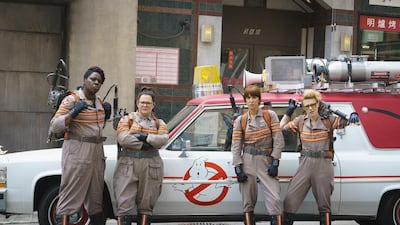When Hollywood is out of fresh ideas – that is to say, on pretty much any day of the week – we do a thing called flipping or reversing.
Consider, for instance, the phenomenal success of the Taken series of thriller pictures – you remember those, right? Liam Neeson plays a dangerous and mysterious guy who is always forced to save his wife and daughter from extreme peril. As the box office millions rolled in, two reactions spread across Hollywood.
Well, three, actually. The first thing anyone does when they have a hit movie is set about making sequels. Because they own the characters and the setting, only the studio behind Taken was legally allowed to jump into action, which they did at lightning speed. There are three Taken movies already, with rumours of a fourth on the way.
But what about the producers and writers who don't own the Taken franchise but still want to get in on the bonanza? Well, the second thing we do in Hollywood when we notice a monster hit that is someone else's property is reverse it. We ask ourselves: is there a Taken-style picture were it's the father who is in danger and the child who must rescue him? I don't think I'm exaggerating when I say that I've heard about a dozen versions of this, all described by their excited producers and writers as, "basically, the dad is captured by evil doers and the kid has to rescue him. It's Reverse Taken!"
The third possibility is what we call the flip. You take a successful movie and you remake it, but you flip the sexes of the main characters. So, in Flipped Taken, the Liam Neeson character would be a female former agent of some clandestine operation – played, probably, by an attractive and fit actress in her first big role – but the rest of the picture is pretty much a shot-for-shot copy.
That’s one of the benefits of flipping over reversing – the story stays the same, essentially, which means a lot less work.
Sony Pictures has just released a flipped version of the 1980s smash comedy, Ghostbusters. They took the premise of the original movie – a quirky team of paranormal investigators tasked with ridding New York City of its resident evil demons – and then switched the sexes of the main characters.
Co-written and directed by Paul Feig – the man who brought us Bridesmaids and Spy, among other successful comedies – the project should have been seen for what it really is: a perfectly reasonable attempt of a big movie studio to release a new picture without going through the major headache of coming up with a new picture.
They stocked the cast with major comic talent – including Melissa McCarthy and Kristen Wiig – and along with the ferociously talented Feig, they assembled a dream team of a production crew.
What they didn't anticipate was the response from some quarters of their audience who reacted to the newly-flipped Ghostbusters with hurt and outrage. On Twitter and other social media platforms, fans of the original Ghostbusters – mostly, it must be said, male fans – claimed the new version was a desecration of a classic. "You've stolen my childhood," one of them wailed to his (presumably) 10 or so Twitter followers.
The studio and the filmmakers were caught off guard by the reaction. After all, no one really thought of the original Ghostbusters as a Citizen Kane or 400 Blows. It was a funny picture, sure – I saw it when it was first released; I think I was 17 – but on a list of comic masterpieces, it would surely rank way, way down there.
But movie fans have tricky and unpredictable emotions. When you mess with their long-past favourites, you’re turning their memories upside down. Fans who fall in love with certain pictures do so because of a complicated psychological blend of the merits of the movie itself, the time and place they saw it first, with whom they saw it, and who they were when they sat there, in the dark cinema, watching the story unfold.
When you love a movie, you love the memory of it, and you come to think of it as something you own. So it's a shock to be reminded – as Sony Pictures Entertainment did to millions of Ghostbusters fans – that the movie is not a memory, it's a product, a piece of intellectual property owned by an incorporated entity whose sole mission is to maximise the value of its shares.
The arguments about the flipped Ghostbusters raged throughout its production and well into its first week in the cinema. Those who hated the idea were called sexist by those who didn't. Those who loved the idea were called hopelessly politically correct by those who disagreed.
Lost in all of the back and forth was any discussion of the only important issue worth discussing: is the picture funny or not? Because flipping, or reversing, an old movie is really only the first step. The next step – actually making a good movie – is the hardest.
Rob Long is a writer and producer in Hollywood
On Twitter: @rcbl

